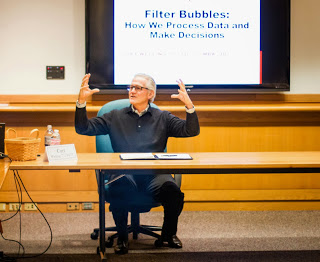- Public Policy
- Leadership
- Funding
- News & Events
- About the Center
Back to Top Nav
Back to Top Nav
Back to Top Nav
Back to Top Nav

RLF had the honor this week of welcoming Mr. Curt Welling '71, chair of the Rockefeller Center Board of Visitors and CEO of disaster relief nonprofit AmeriCares. His presentation provided meaningful insights into how we can better understand ourselves and perceive the world around us. His session focused on a concept coined by Eli Pariser's Ted Talk “Filter Bubbles.”
Essentially, the web is supposedly an open forum of idea exchange and knowledge acquisition, but with the implementation of market strategies like personalized searches, technology has actually filtered out the things we don’t want to see/read/hear from our online interaction space. In the real world, this translates into our group affiliations, cultures, political ideologies, self-images, etc. wrapping us in filter bubbles that prevent us from critiquing our assumptions and exploring information that is uncomfortable or contrary to our own beliefs.
With his extensive background in both the public and private sectors, Mr. Welling's personal stories were especially salient in proving his points, and they certainly showed a willingness to evolve our natural filtering processes based on a conscious effort to breach our filter bubbles. He spoke about the ladder of inference as both a trap and a framework to address our mistaken beliefs. We need to align our perspectives with those of others around us which we can do by asking questions to fill in missing data instead of climbing up the ladder of inference only to make decisions using inaccurate opinions. Mr. Welling challenged us to apply this knowledge to our lives and future workplaces by learning how to walk others down the ladder of inference, being civil in addressing mistakes in others' inferences, and balancing inquiry and advocacy as leaders in an increasingly technological society.